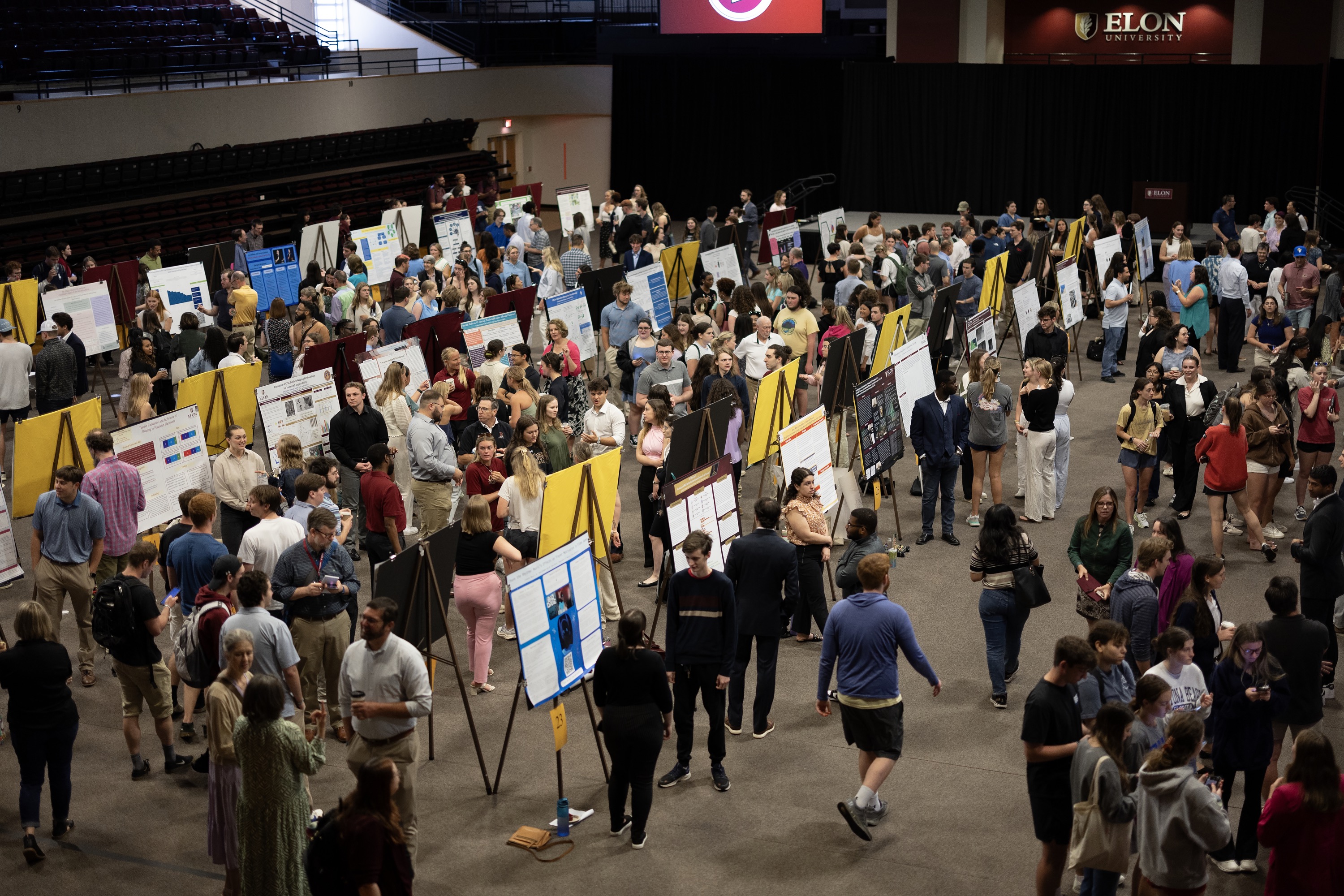The 31st annual Spring Undergraduate Research Forum features hundreds of students participating in poster sessions and oral presentations throughout the day.
Someone taking a walk through Alumni Gym on Tuesday would have overheard conversations about generative AI, toxic chemicals contaminating water supplies, how TikTok influencers are driving weight loss conversations and how religion is portrayed in in children’s literature.
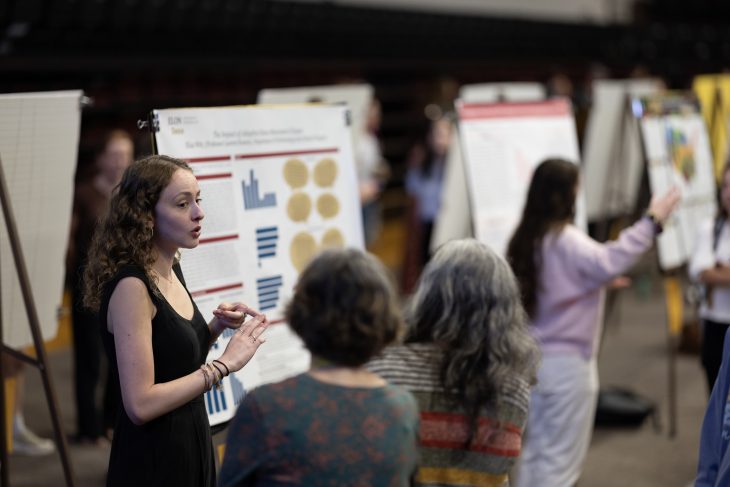
Across campus, student researchers wielded microphones to discuss their findings in oral presentations focused on topics such as a numerical simulation of jellyfish swimming, an analysis of attendance patterns in national women’s soccer leagues and insights into the impact of student loans on the racial wealth gap in the United States.
And that’s just a small sampling of the hundreds of well-researched and insight-filled discussions that filled the air throughout the day at Elon.
That’s because Tuesday was SURF Day, with the Spring Undergraduate Research Forum seeing a record number of students presenting the fruits of their intensive work with mentors on diverse and broad topics touching many corners of academics as well as personal and professional life. The paths these students took to become engaged in undergraduate research were nearly as diverse, with some pursuing topics with deep personal connections and others seeing topics arise out of their close work with a faculty member.
“This is probably the most impactful thing that I’ve done at Elon, being able to combine my passions with what I’ve been learning in the classroom,” said Ethan Singer ’24, who is majoring in business analytics and presented during a poster session in Alumni Gym. “I woke up this morning, and I was excited to come here and present.”
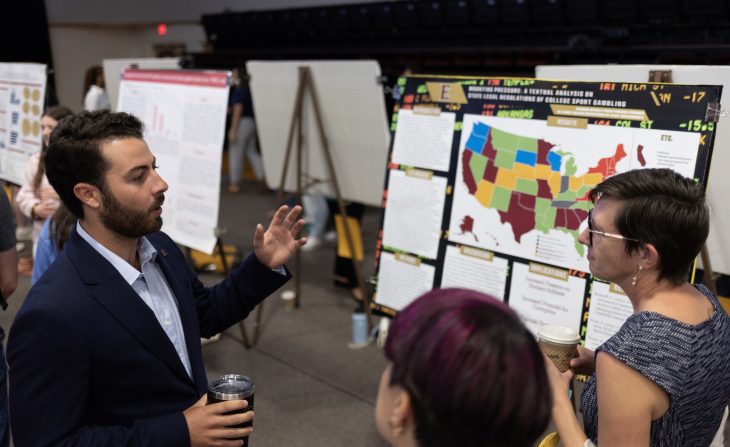
Now in its 31st year, SURF is an annual showcase of research, exploration and creative activity that includes participants from all corners of campus. The day saw 321 presentations, including 167 poster presentations and 154 oral presentations and performances in 35 sessions. This showcase of undergraduate research is so important to Elon as an institution that classes are canceled throughout the day so that students, faculty and staff may attend SURF.
“Institutionally, SURF is something that sets Elon apart,” said Associate Professor Jen Hamel, who is associate director of undergraduate research at Elon. “In a systemic way, that intentional setting aside of the day tells everyone at the university the value and the emphasis of these activities. This is so important that we are not going to have class. It doesn’t get any bigger than that for students.”
Personal connections
Journalism major Alexandra Borda ’24 drew from her personal experiences to identify a topic to research with mentor Dan Haygood, professor of strategic communications. A first-generation college student, Borda grew up watching telenovelas, Spanish-language soap operas, with her mother and grandmother, and came to be concerned with the stereotypes these TV shows perpetuated about women, particularly the idea that women are fragile.
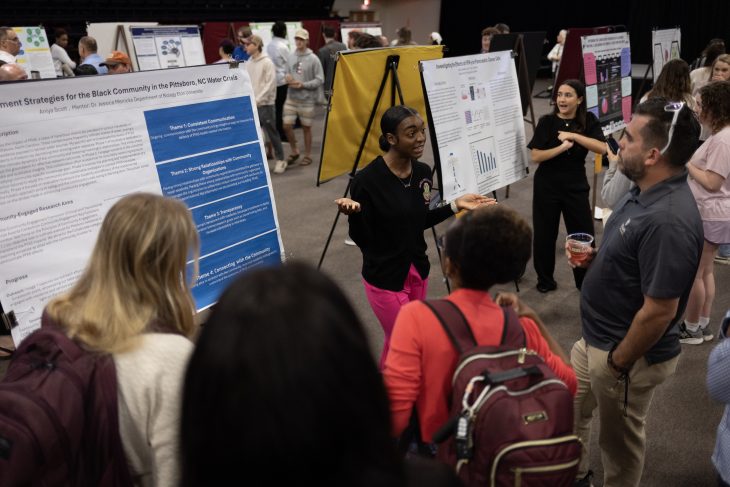
Working with Haygood, Borda conducted a qualitative analysis comparing telenovelas with U.S. soap operas. She was able to identify that in more recent years, telenovelas have challenged those stereotypes with leading female characters who are ambitious or powerful while many of their U.S. counterparts. That is significant in that the global audience for telenovelas is about double that for U.S. soap operas.
Working closely with Haygood has provided her with skills she expects to lean upon long after she has graduated from Elon, including how to conduct intensive content analysis from different perspectives. She had been intimidated by public speaking, but earlier opportunities to present her research have helped her build confidence. “I’ve learned not only how to conduct this type of intensive research, but then how to put it into words,” Borda said. “I hadn’t initially been planning to present at SURF, but Dr. Haygood encouraged me and helped me realize I could do it.”
Hamel said SURF serves an important role in providing students who are in their first years at Elon to see a place for themselves within undergraduate research and see people like them pursuing intensive work on complex topics. “A student can walk into the poster session and spend and hour there and really get a sampling of so many disciplines,” Hamel said. “They can see the possibilities that are open to them during the next two to three years. How else are they going to encounter so many possibilities?”
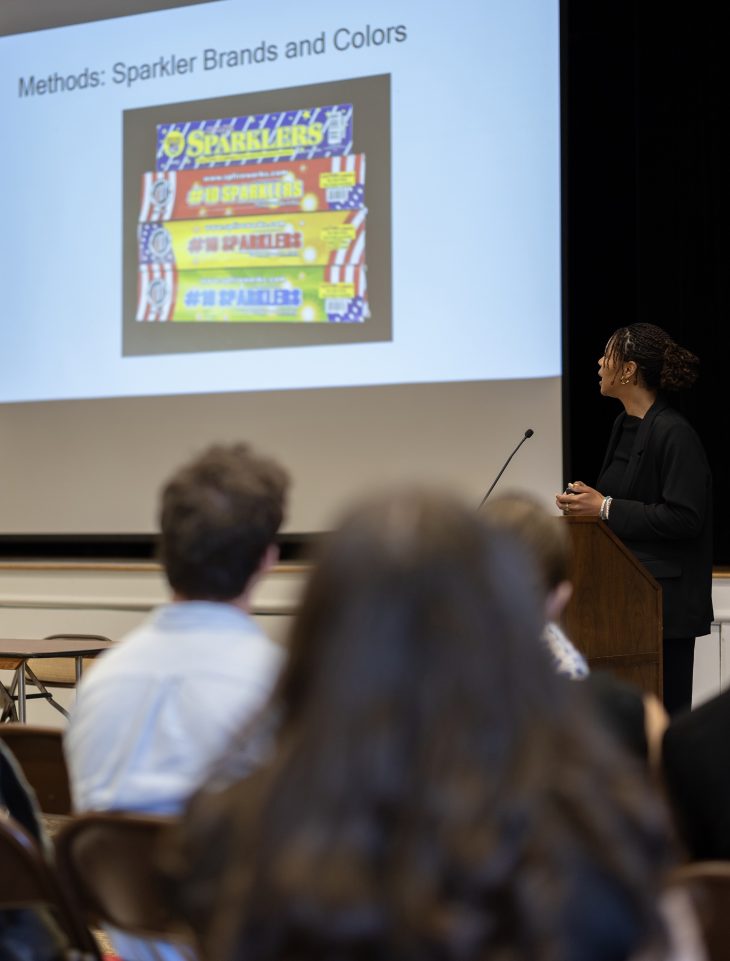
Elon is renowned for the level of support it provides for undergraduate research, with the university offering pathways for students to work closely with faculty and staff mentors in the pursuit of knowledge and discovery, often from the first days of their college careers. The university has previously received the Campus-wide Award for Undergraduate Research Accomplishments (AURA) from The Council on Undergraduate Research for providing high-quality research experiences for undergraduates.
Defining a focus
For many students, SURF is the culmination of years of work on their research. Honors Fellow Kaitlyn Litvan shared her insights Tuesday into her analysis of how environmental activists can be most effective in making their case on the social media platform Instagram. Gathering responses to various mock Instagram posts featuring different central characters (a celebrity, an academic, a “regular person, or just text), Litvan discovered that certain approaches fostered better connections with the audiences. She learned how to conduct the required data-intensive analysis through her work with mentor Qian Xu, professor of strategic communications. A key finding was that text-heavy posts were the least effective.
Litvan said she met regularly with Xu throughout her research, which is a key component of her experience as an Honors Fellow. “We really got close to one another,” Litvan said. “We were able to learn each other’s processes and learn how to bounce ideas off of each other. To be able to combine our shared interests and make a project out of nothing was really meaningful.”
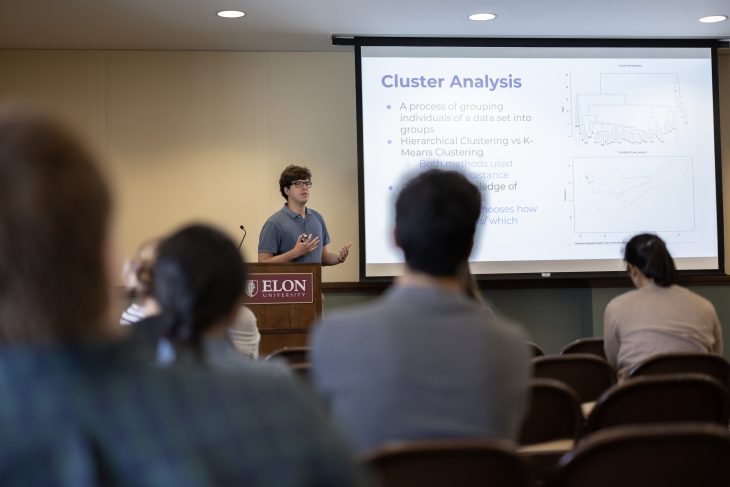
One of the challenges for Elon undergraduate researchers is to identify a gap in the research of a topic and to define a project that will help fill that empty space. Lauren Copenhaver ’24 decided to focus her research on the growth of pancreatic cancer cells, and recognized that there had been little progress in determining why there was a significant disparity in incidence rates between men and women.
After her grandmother was diagnosed with pancreatic cancer, her interest in the project only grew. “I was inspired to conduct research that can help us learn more about the disease and the differences between men and women and how hormones impact different bodies that we have yet to understand,” Copenhaver said.
Copenhaver first met Associate Professor of Biology Yuko Miyamoto when she was a prospective student, and she would get to know Miyamoto while working as a lab assistant, which first exposed her to Miyamoto’s research focus and helped lay the groundwork for her research into how estrogen, chemotherapeutics and the combination of the two affects the growth of pancreatic cancer cells.
“When I was younger, I never thought I would be able to be doing cancer research as an undergraduate,” Copenhaver said. “Now I have developed a project I am incredibly passionate about and have had the opportunity to present it across the country, attend professional conferences, and talk about my research in spaces like LIFE@Elon and the Elon Leads campaign celebration. If you would have told me then I would be doing what I am now, I never would have believed you, but I am incredibly grateful to the support I have received at Elon for showing me that I can do the unimaginable.”
Building skills beyond the research
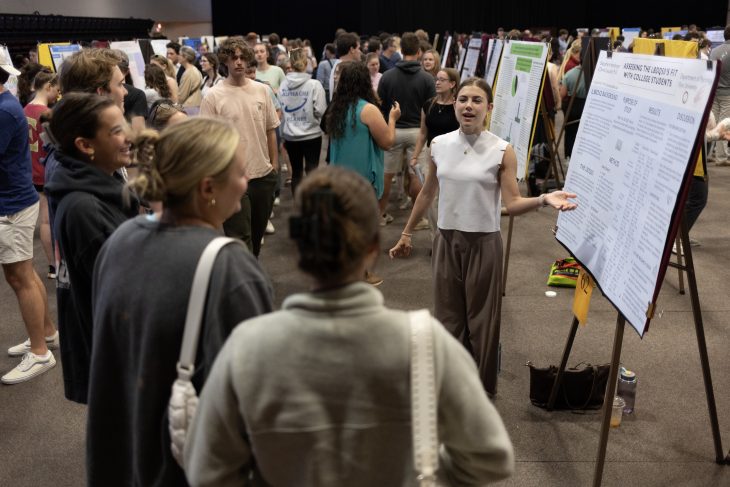
Students who present at SURF, whether it’s during a poster session or an oral presentation, have to be prepared to explain their research not only to the students and faculty within their discipline, but those who may be less familiar. That preparation is valuable to students as they work through how to convey what they have learned and know to a variety of audiences, Hamel said.
“The act of developing a presentation about immersive work you’ve done with a mentor over the last one to two years causes you to reflect on and synthesize what you’ve done and make meaning from it,” Hamel said. “Learning how to communicate it to an academic audience as well as to a broad audience is a developmental opportunity that really benefits our students. When they do that, they leave Elon with this incredibly valuable skill and experience engaging with that skill.”
Research topics can arise from a variety of experiences, including internships. That was the case for J’Lynn Poplin ’25, who is majoring in human service studies and policy studies. She began work on what would become her undergraduate research project while participating in an internship with Alamance County Child Mediation Services, through which she came to recognize a lack of representation for nontraditional families, particularly LGBTQIA+ families. She has realized that “I do not have to make a huge discovery to create an impact” and she hopes her work will contribute to a more comprehensive understanding of LGBTQIA+ parental rights.
“I aspire to demonstrate to fellow first-generation college students that we possess the ability to engage in research and effect positive change within our respective fields of study,” Poplin said. “By showcasing the potential for impact despite any initial feelings of being outside our comfort zones, I aim to empower individuals from similar backgrounds to pursue academic endeavors with confidence and determination.”
‘Understanding what we’re capable of’
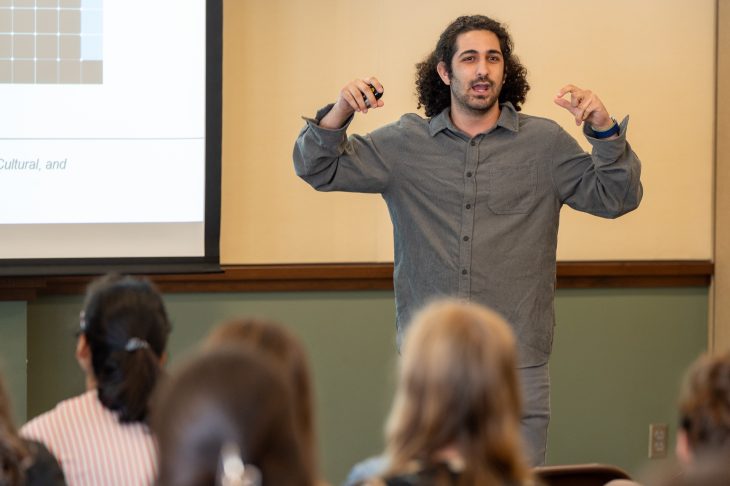
Over time, Elon has begun tracking more information about the broader themes within undergraduate research and how the research was conducted. This year, 72 presentations self-identified as projects related to diversity, equity and inclusion, 43 presentations were self-identified as projects related to sustainability and 85 presentations were self-identified as data-intensive projects.
While undergraduate research advances the body of knowledge within a student’s field, it can also provide clarity for where they want to go professionally and can equip them with the skills to get there. Moris Menjivar Alfaro ’24 said he was “hooked” when Associate Professor of Engineering Scott Wolter talked with him about collaborating with researchers from Duke University to study the efficacy of ion pumps for underwater spectrometry to measure methane in water systems. He views the work he’s doing as leading toward a better understanding of the environment and the impact humanity has upon it. It’s also helped him better understand what lies ahead for him, with the engineering major planning to join Wolfspeed in Durham as a manufacturing equipment engineer.
“I feel like my undergraduate research with Dr. Wolter has basically laid the pathway for understanding what we’re capable of when we’re given the tools,” Menjivar Alfaro said. “Working alongside a professor to conduct research is very different from seeing a professor in class, and I would recommend other Elon students get involved in undergraduate research.”
Margaret “Maggie” Hayes ’24, a Teaching Fellow and middle grades education major minoring in psychology, researched approaches to teaching middle schoolers about the effects of social media and how to make those lessons relevant to students. She said her research with Assistant Professor of Psychology Ilyssa Salomon gave her a leg up in the job interview process because it showed she was thinking ahead about how to support and reach students in an area K-12 systems are grappling with.
“It comes up in job interviews, because it’s not often that future teachers are completing undergraduate research, and it’s helped me stand out in the application process,” Hayes said. “It’s directly applicable to my teaching and I feel like I can give better guidance for my students through my research.”
Elon also provided a platform for local high school students to present research they’ve been conducting. Six research teams from Williams High School in Burlington that have been working with Lecturer Larry Cantwell and Senior Lecturer Ryne VanKrevelen from the Department of Mathematics and Statistics presented their work at SURF Day which was focused on a variety of topics related to the academic and social experiences of college and high school students.
Additonally, SURF included an interdisciplinary symposium on “Identity, Politics, and Place, in a Globalizing World” and an interdisciplinary symposium on “American Studies Research.”



